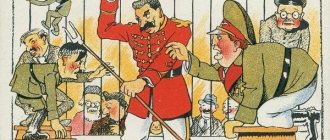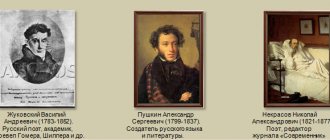N. Machiavelli is believed to be the author of the quote “It is the retinue that makes the king.”
The author of the quote: “It is the retinue that makes the king,” according to N. Machiavelli.
Next, we will analyze what meaning the classic put into this thesis, and what he advises us... be patient, the thesis is very concise and requires disclosure, because not everything is immediately obvious.
Quote from Henry IV, King of France: “My state is my friends, the warriors standing at my throne. I am of little interest in their wealth and nobility, both of which I am able to give them myself, but who, besides them, can give me confidence in a prosperous reign in our glorious France? Therefore, I can only wish that each of my crowned neighbors surrounds himself with a similar retinue, to whom you are not afraid to turn your back.”
There is an analogue to the Russian proverb “like the priest, so is the parish,” but this is only a partial similarity. Next you will find out why.
There are several different interpretations of this thesis. This statement can be considered a stratagem, a technique, a thesis, a management tool, but this does not change the essence.
- this is a recommendation for kings (leaders) to form their retinue wisely
- this is a recommendation to ordinary people who seek power
— When and how can this be used?
{Recommendation for those who aspire to power.}
If we look at our activities or anyone else’s, we will notice that we periodically need to solve certain problems, the essence of which is “to convince someone to do something.” It could be anyone, friend, employee, boss, wife, husband, children, etc. Sometimes those around us, or those to whom we turn, listen to us and do what they are asked to do, and sometimes we receive a refusal, which can be expressed mildly or rudely, depending on our status and the mood of the interlocutor. To resolve any issues related to society or personalities, we usually need money or power, most often people chase after these attributes. For example, people do business for the sake of money and prestige, and they also seek positions in the government system for this reason.
What to do if you do not have money to pay for services or do not have the power to coerce?
What methods exist to achieve resolution of your issues if there is no money and no positions (power)?
In fact, both the one who is rich and the one who has power/position uses his “authority”, which the position or money gives him. In fact, we are faced with the task of acquiring authority in the eyes of society or the right person, and wealth and power are just intermediate tools that are used to build authority or for coercion if it is not possible to form authority.
One of the powerful tools for creating authority is this stratagem, voiced in the title. The advantage of this tool is that it does not require special knowledge or willpower, or anything else. This tool is accessible to any average person. True, few people use this, despite the great opportunities this stratagem provides.
One of the reasons for this “inability” lies outside this stratagem. Most entrepreneurs or managers simply do not have a goal, they live “today” or “obvious events”, but more on that another time 
**
{Recommendation for those who shape their environment.}
What does it mean “The king is made by his retinue” - this thesis is a management tool; in the modern world it is called “image”.
This thesis has very serious practical significance for managers and people engaged in public activities, for those who, by occupation, must manage people, directly or indirectly. The meaning of the thesis “The king is made by his retinue” has a deeper/broader meaning than the image tool, but they are concepts of the same order .
Presumably, the author of the quote intended the following meanings:
- the “king’s” environment is sometimes more important for solving real problems than the king’s personal abilities
- the opinion about the king (leader) is formed from the image of the environment, because For most people who do not have personal contact with a leader, it is impossible to form an opinion about him. Accordingly, you need to carefully select employees from your immediate environment, taking this factor into account.
- you can “hire” a temporary environment, set them the task of “playing a game” in order to form the desired opinion
**
One of the functional qualities of the thesis “The king is made by his retinue” is that the king (leader) often has to work in different social roles (driver, father, husband, friend or offender, petitioner, boss, etc.). Different roles require different skills, and people are very bad at this; even professional actors are bad at playing diverse roles. There are many reasons, and they are complex, a certain intellectual predisposition and character of people. So, the “king” must fulfill these social roles if he does them well himself, and what he does poorly must be TRANSFERED to his entourage (personally). This is where it creates a certain positive or negative effect. This task can be carried out by different people, and they can be assessed according to the subjective criteria of “smart guy” or “crook”. We need to clearly understand who our (royal) representative is. To perform their direct responsibilities efficiently, managers must resort to the help of their environment, and if it is formed on the basis of real tasks, and not whims, then the effectiveness of management can increase exponentially.
***
According to one version, the phrase “The king is made by his retinue” was said by the great Italian thinker N. Machiavelli, where he said/wrote this, it has not yet been possible to clarify (I have not found the data), but in the book “The Sovereign” there is a recommendation/thesis that is close in meaning, the essence of which is as follows... According to N. Machiavelli, the people form an opinion about the sovereign based on his environment, that is, his reputation and, as a consequence, the attitude of those around him depend on the people surrounding the leader. Of course, we are talking about when direct contact with the manager is excluded, i.e. The staff does not have the opportunity to directly check the “qualities” of the leader.
A leader should never forget about one of the most important laws of managing people: the retinue plays the king.
*
It seems to me that those involved in politics (especially newcomers) or business clearly underestimate this stratagem. In my opinion, the attractiveness of this stratagem is its simplicity and high efficiency, and plus it can be called a “multi-model principle”, i.e. can be used to solve different problems.
Here are two options/directions that are obvious:
— a manager (more than 300 employees) can use this technique to shape his image or even corporate culture
- any person can form “authority” for himself in the eyes of the target audience, for further work, as an intermediate stage
How can this be done, how to build authority (manager or employee is not so important)
When we need, in the long term, we need to form among society or among employees (more than 300 people/team) a “serious” opinion about our status... for example, to increase the value of instructions/recommendations, to increase the value of our gifts/favors, etc.
One of the methods is the following technological chain. We take as a basis that we have 5-10 people around us with average abilities, and the rest of “society” evaluates them the same way.
1. It is necessary to set a goal/task for the environment to form the image of the leader and they must accept this task as important
2.Use society’s stereotypes, i.e. what is considered to be a “respectful attitude” in a given society, for example:
— the environment stands up when he enters the room
— the entourage wears a “manager’s folder” and accompanies them at meetings and in public places
- when the leader is talking, the others remain silent and do not interrupt
- periodically quotes the manager’s words “he said so”
- and other signs of attention appropriate to a senior/manager/authority
**
In fact, the concept of “the king is played by his retinue” is a stratagem (method) that can be used in business as well. Let's imagine a situation that we have resources that will help form a small loyal group of clients, or these resources can be spent on a standard increase in sales through advertising. As a rule, most will do the latter, since the benefits are obvious. But if you think about it, using this method “It is the retinue that makes the king,” you can form a loyal group of clients who can be used as carriers of the company’s values. Through them, the company's advertising will be more effective. This situation is reminiscent of the dilemma: “...buy a fishing rod or fish.”
***
Cases of how image influences the situation, and how the image is formed.
There is an interesting case in literature (happened in France) when a servant dressed up in the clothes of the king so as not to be detained at the border. A certain duke/prince was put on the wanted list after another unsuccessful palace coup. The Duke barely escaped. The only servant/footman who was with him, knowing that the highway patrols were looking for them everywhere. These were “dark” times, veneration for rank was prohibitive. Which is what the footman/servant (obviously smarter than his master) took advantage of. The patrolmen on the roads, seeing the expensive clothes of the lackey, will simply be interested in the gentleman in fear.
*
The case of an American gangster (Licio Gelli), who sent out two tickets each to another hundred crime bosses for a heavyweight boxing match... and when he entered, they all stood up, because then it was customary to greet familiar and respected people by standing up... the effect was that , that they stood up AT ONCE, without knowing it, they created a “bomb” effect... which is what the crime boss was counting on. This is also a variation of the stratagem “The king is made by his retinue,” or, to rephrase, let’s say, “the entourage makes the king.”
***
Adjutants General
But this did not happen right away. Before the reign of Peter I, the retinue was, to put it mildly, service personnel with certain powers. Since 1713, the butler turned into a chief marshal, the bed servant became a chief chamberlain, the charmer became a mundan, and the room nobleman became a chamberlain cadet. The rest of the court ranks underwent similar changes, as a result of which the usual retinue turned into a hodgepodge of military ranks. Peter I was also of the opinion that, in addition to the crowd surrounding him, there should be at least two people in its number whom he could trust as he trusted himself. Therefore, in the same 1713, he specially introduced two positions of adjutant general, which were immediately filled by “sovereign people”: Pavel Yaguzhinsky and Anton Devier. They were later the first to receive equally important positions: Yaguzhinsky became the Prosecutor General of the Empire, and Devier became the Chief of Police of St. Petersburg.
Anna Ioannovna decided that two adjutant generals were not her size, and increased their number to ten. History is silent whether these people were loyal to their empress to the last drop of blood, or were simply glad of the “grain places”. Anna Ioannovna appointed only battle-tested generals to the position - either she was stroking her ego (it’s nice to command people who had earned the respect of soldiers during hostilities), or she decided that they were the ones who were better able to cope with the responsibilities assigned to them than others. However, the generals were not burdened by the new position - the lack of hassle, simple tasks such as accompanying the empress into society and the excellent salary more than compensated for their damaged pride in some places. One of the first adjutant generals under Anna Ioannovna was Ernst Biron’s brother, Gustav. However, despite the warm place and dust-free work, he stayed with the empress for only three years: deciding not to abuse the hospitality and not caring about patronage (or maybe he was pretty guilty - who will sort them out behind the scenes), Gustav, three years after his appointment, left for The Russian-Turkish War, where he showed himself in all his glory: he distinguished himself in battles more than once, earned the respect of both the command and his subordinates, and eventually received the rank of general-in-chief.
In 1775, a title appeared specifically for the retinue. He was introduced by Catherine II, and the aide-de-camp, having taken his rightful place in the retinue, also snatched a place in the Table of Ranks: there the rank was comparable to an army colonel. Only officers who managed to distinguish themselves in some way during military service could occupy it. The status of the adjutant general increased: now only a person with the rank of lieutenant general or higher could boast of it.
Each representative of the imperial family himself determined the number of people in his retinue, but over time its number steadily increased. Alexander I was surrounded by 71 people, Nicholas I - 179, and Alexander II - more than 400. Only under Alexander III did the environment noticeably thin out: only 105 people remained in the retinue. Nicholas II decided that this was not enough for him, and again “increased” his retinue, although not by much: in 1914 it consisted of 171 people, including more than 60 major generals and rear admirals - they also began to be accepted for court positions . But on the other hand, there were fewer high-born nobles: if under Alexander I, “rootless” occupied a third of the places of the total number of adjutants general, then in the circle of Nicholas II only every fourth could boast of a noble family.
Adjutants General
But this did not happen right away. Before the reign of Peter I, the retinue was, to put it mildly, service personnel with certain powers. Since 1713, the butler turned into a chief marshal, the bed servant became a chief chamberlain, the charmer became a mundan, and the room nobleman became a chamberlain cadet. The rest of the court ranks underwent similar changes, as a result of which the usual retinue turned into a hodgepodge of military ranks. Peter I was also of the opinion that, in addition to the crowd surrounding him, there should be at least two people in its number whom he could trust as he trusted himself. Therefore, in the same 1713, he specially introduced two positions of adjutant general, which were immediately filled by “sovereign people”: Pavel Yaguzhinsky and Anton Devier. They were later the first to receive equally important positions: Yaguzhinsky became the Prosecutor General of the Empire, and Devier became the Chief of Police of St. Petersburg.
Anna Ioannovna decided that two adjutant generals were not her size, and increased their number to ten. History is silent whether these people were loyal to their empress to the last drop of blood, or were simply glad of the “grain places”. Anna Ioannovna appointed only battle-tested generals to the position - either she was stroking her ego (it’s nice to command people who had earned the respect of soldiers during hostilities), or she decided that they were the ones who were better able to cope with the responsibilities assigned to them than others. However, the generals were not burdened by the new position - the lack of hassle, simple tasks such as accompanying the empress into society and the excellent salary more than compensated for their damaged pride in some places. One of the first adjutant generals under Anna Ioannovna was Ernst Biron’s brother, Gustav. However, despite the warm place and dust-free work, he stayed with the empress for only three years: deciding not to abuse the hospitality and not caring about patronage (or maybe he was pretty guilty - who will sort them out behind the scenes), Gustav, three years after his appointment, left for The Russian-Turkish War, where he showed himself in all his glory: he distinguished himself in battles more than once, earned the respect of both the command and his subordinates, and eventually received the rank of general-in-chief.
In 1775, a title appeared specifically for the retinue. He was introduced by Catherine II, and the aide-de-camp, having taken his rightful place in the retinue, also snatched a place in the Table of Ranks: there the rank was comparable to an army colonel. Only officers who managed to distinguish themselves in some way during military service could occupy it. The status of the adjutant general increased: now only a person with the rank of lieutenant general or higher could boast of it.
Each representative of the imperial family himself determined the number of people in his retinue, but over time its number steadily increased. Alexander I was surrounded by 71 people, Nicholas I - 179, and Alexander II - more than 400. Only under Alexander III did the environment noticeably thin out: only 105 people remained in the retinue. Nicholas II decided that this was not enough for him, and again “increased” his retinue, although not by much: in 1914 it consisted of 171 people, including more than 60 major generals and rear admirals - they also began to be accepted for court positions . But on the other hand, there were fewer high-born nobles: if under Alexander I, “rootless” occupied a third of the places of the total number of adjutants general, then in the circle of Nicholas II only every fourth could boast of a noble family.











